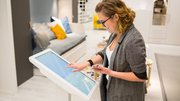News
Self-service revolution
July 5, 2004
WASHINGTON - The self-service revolution is taking consumers out of lines, reducing their wait times and giving them control, according to an article in the The Washington Times.
"Everybody was worried about the adoption [of self-service kiosks] because they would think it's poor service, when in fact it's good service," said Steve Laughlin, partner at IBM Consulting Services. "Customers feel a sense of control."
But while more companies adopt a self-service model, some users still prefer the old ways. They're just not interested in doing it themselves.
"There are going to be some people that will reject this technology because it's different," said Lee Holman, vice president of product development for IHL Consulting Group, which tracks retail technology. "They just aren't comfortable with it. That's human nature."
Trying to ease employee concerns, most industries insist their self-serve technology is not replacing employees.
"When [ATMs were] first introduced, futurists thought we would be living in a teller-less society," John Hall, a spokesman for the American Bankers Association said. Instead, ATMs have become an "enhancement" to a bank's services, he said.
According to the article, many companies are reluctant to discuss how it affects their staffing levels.
"It's a touchy situation," said Francie Mendelsohn, president of Summit Research Associates Inc., a Rockville firm that provides consulting and kiosk research. "If you can deliver the same service or better with less employees, your stockholders are going to love you."
But John A. Challenger, chief executive of outplacement firm Challenger, Gray & Christmas Inc., said self-service will replace employees increasingly over the next five years.
"There's no question kiosks and self-checkout are going to mean those jobs don't need to be done by people," he said.
Flying high
The airline industry has established its position as a leader in self-service according to the article.
"There's no question that self-check-in speeds the process tremendously," said Jason Schechter, a United Airlines spokesman. "It's not just about speed, though. It's about putting a lot of controls in the passenger's hands. That's a benefit that people overlook."
C. David Wick, 77, used a check-in kiosk for the first time in April. "I just followed the instructions. It was less trouble than going to the counter," Wick said. "I'm 77. I have a rule to stay away from those things. But I decided this time to try it."
Kimberly Howard used a Southwest check-in kiosk for a recent flight. "It's so quick. It tells you exactly what to do," Howard said. "You don't have to wait in lines."
The hotel industry also is adding self-serve kiosks to get guests to their rooms quicker, according to the Washington Times.
"We're taking the agents from behind the desk and putting them up close and personal [with the guests]," said Rod Mano, senior director of property technology at Starwood. "This is a great speed enhancer. If we're able to get a person checked in two or three times faster, we are hoping they are getting a better experience. We're hoping it increases guest retention."
Hilton, who collaborated with IBM, is so satisfied with the results of its two-hotel test that it plans to install more kiosks at the company's top 25 hotels.
"This is more of a guest-satisfaction requirement. They really demanded alternatives to the delays of getting to their room," said Thomas Spitler, vice president, front office operations and systems for Hilton. "We think we'll be rewarded by increased customer loyalty."
According to the article, Marshal Cohen, chief analyst at NPD Group, said the kiosks aren't the best idea in some cases.
"They do help speed up the process, but they also completely disconnect the retailer from the customer," Cohen said. "Interaction is critical."
When the salesperson is eliminated, there is no chance to offer additional items for sale, educate consumers or help build customer loyalty, he said.
Some fast-food chains such as McDonald's and Burger King are testing self-serve kiosks.
"It's something of interest to us," said Jose Cil, director of operations at Burger King. "There's still a significant amount of work that needs to be done to figure out if it makes sense from a business standpoint."
McDonald's claims it doesn't expect to lose any workers to the kiosks, according to the article. "We still need the same number of employees so they can focus on customer service," Howard said. "It is important for us to be able to serve customers quickly."










